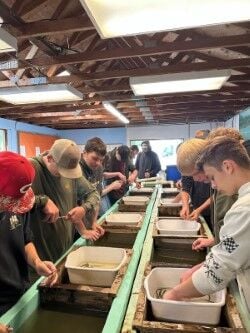Bear Creek Golf Center opens renovated driving range, bringing an upgrade to the Rogue Valley’s only covered driving range.
Category: News and Notices
Coquille River small mouth bass derby extended
Coquille Tribe remembers Jimmy Buffett
Native nations on front lines of climate change
Sharing knowledge and finding support at intensive camps. Associated Press covered the camp the members of the Coquille Tribe Climate Resilience Taskforce recently attended in Washington.
Dept of Transportation funds to help salmon
The Coquille Indian Tribe are among the agencies that will receive more than $19 million to get rid of barriers that have made it difficult for threatened fish to journey from freshwater rivers and streams to the ocean and back.
CIT will co-produce groundbreaking research
A University of Oregon research team has landed a $3 million federal grant to work with Indigenous and rural communities in Oregon to find ways of reducing climate-changing carbon in the atmosphere in ways that build trust with historically marginalized groups.
College tuition breaks there for some
Some states are instituting free or reduced tuition programs for Native American students, but those from tribes not recognized by the federal government don’t qualify.
Salmon smolt 2023
Salmon smolt released into Coquille waterways
Thousands of young salmon have been released into the waterways of the Coquille River thanks to the help of a group of students at Coquille Junior/Senior High School.
Breaking the law to uphold it
One man’s 2011 clam digging citation became a watershed event for the Coquille Indian Tribe. It was one of many battles that the Pacific Northwest’s Indigenous peoples have fought to preserve access to traditional foods.
In a seven-part project, Indian Country Today explores the issues surrounding “food sovereignty.”
Public comments welcome on intersection project
Tribal members are welcome to submit public comments on the Kilkich Transportation Safety Project and proposed changes to the Tribal-Transportation Improvement Program through the BIA.
Call or e-mail Matt Jensen if you have any questions or want to provide comments on the proposed T-TIP update on the Kilkich Transportation Safety Project.

